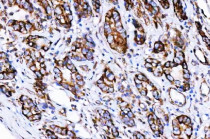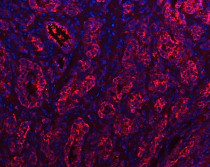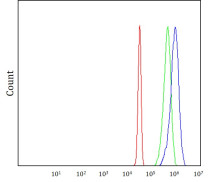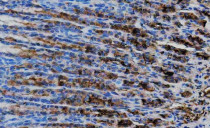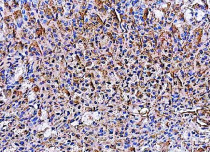ARG44464
anti-PGC / Progastricsin antibody
anti-PGC / Progastricsin antibody for IHC-Formalin-fixed paraffin-embedded sections,ICC/IF,Western blot,Flow cytometry and Human,Mouse,Rat
Overview
| Product Description | Rabbit Polyclonal antibody recognizes PGC / Progastricsin |
|---|---|
| Tested Reactivity | Hu, Ms, Rat |
| Tested Application | FACS, ICC/IF, IHC-P, WB |
| Host | Rabbit |
| Clonality | Polyclonal |
| Target Name | PGC / Progastricsin |
| Antigen Species | Human |
| Immunogen | Human PGC / Progastricsin recombinant protein |
| Conjugation | Un-conjugated |
| Alternate Names | PGC; Progastricsin; Pepsinogen C; EC 3.4.23.3; Gastricsin; Progastricsin (Pepsinogen C); Pepsinogen Group II; Preprogastricsin; EC 3.4.23; Pepsin C; PEPC; PGII |
Application Instructions
| Application Suggestion |
|
||||||||||
|---|---|---|---|---|---|---|---|---|---|---|---|
| Application Note | The dilutions indicate recommended starting dilutions and the optimal dilutions or concentrations should be determined by the scientist. |
Properties
| Form | Liquid |
|---|---|
| Purification | Affinity purification with immunogen. |
| Buffer | 0.9% NaCl, 0.2% Na2HPO4, 0.05% Sodium azide and 4% Trehalose. |
| Preservative | 0.05% Sodium azide |
| Stabilizer | 4% Trehalose |
| Concentration | 0.5 mg/ml |
| Storage Instruction | For continuous use, store undiluted antibody at 2-8°C for up to a week. For long-term storage, aliquot and store at -20°C or below. Storage in frost free freezers is not recommended. Avoid repeated freeze/thaw cycles. Suggest spin the vial prior to opening. The antibody solution should be gently mixed before use. |
Bioinformation
| Database Links | |
|---|---|
| Gene Symbol | PGC |
| Gene Full Name | Progastricsin |
| Background | This gene encodes an aspartic proteinase that belongs to the peptidase family A1. The encoded protein is a digestive enzyme that is produced in the stomach and constitutes a major component of the gastric mucosa. This protein is also secreted into the serum. This protein is synthesized as an inactive zymogen that includes a highly basic prosegment. This enzyme is converted into its active mature form at low pH by sequential cleavage of the prosegment that is carried out by the enzyme itself. Polymorphisms in this gene are associated with susceptibility to gastric cancers. Serum levels of this enzyme are used as a biomarker for certain gastric diseases including Helicobacter pylori related gastritis. Alternate splicing results in multiple transcript variants. A pseudogene of this gene is found on chromosome 1. |
| Function | Hydrolyzes a variety of proteins. |
| Cellular Localization | Secreted |
| Calculated MW | 42 kDa |
| PTM | Disulfide bond, Zymogen |
Images (7) Click the Picture to Zoom In
-
ARG44464 anti-PGC / Progastricsin antibody IHC-P image
Immunohistochemistry: Human gastric adenocarcinoma stained with ARG44464 anti-PGC / Progastricsin antibody at 2 μg/mL dilution.
-
ARG44464 anti-PGC / Progastricsin antibody IHC-P image
Immunohistochemistry: Human gastric cancer stained with ARG44464 anti-PGC / Progastricsin antibody at 5 μg/mL dilution.
-
ARG44464 anti-PGC / Progastricsin antibody FACS image
Flow Cytometry: JK stained with ARG44464 anti-PGC / Progastricsin antibody at 1 μg/10^6 cells dilution.
-
ARG44464 anti-PGC / Progastricsin antibody IHC-P image
Immunohistochemistry: Rat stomach stained with ARG44464 anti-PGC / Progastricsin antibody at 2 μg/mL dilution.
-
ARG44464 anti-PGC / Progastricsin antibody WB image
Western blot: Rat stomach stained with ARG44464 anti-PGC / Progastricsin antibody at 0.5 μg/mL dilution.
-
ARG44464 anti-PGC / Progastricsin antibody IHC-P image
Immunohistochemistry: Mouse stomach stained with ARG44464 anti-PGC / Progastricsin antibody at 2 μg/mL dilution.
-
ARG44464 anti-PGC / Progastricsin antibody WB image
Western blot: Mouse stomach stained with ARG44464 anti-PGC / Progastricsin antibody at 0.5 μg/mL dilution.
